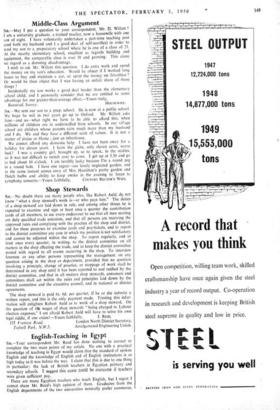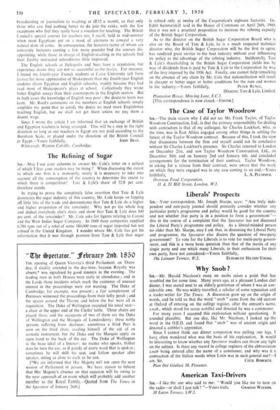. English-Teaching in Egypt
Sut,—Your correspondent Mr. Reed has done nothing to correct or complete the two main points of my article. No one with a practical knowledge of teaching in Egypt would claim that the standard of spoken English and the knowledge of English and of English institutions is as high today as it was before the war. I claim that this is due to one thing in particular: the lack of British teachers in -Egyptian primary and secondary schools. I suggest this cause could be overcome if teachers were given sufficient pay.
There are many Egyptian teachers who teach English, but I regret I cannot share Mr. Reed's high opinion of them. Graduates from the English departments of- the two universities naturally prefer commerce, broadcasting or journalism to teaching at £E12 a month, so that only those who can find nothing better to 'do join the ranks, with the few exceptions who feel they really have a vocation for teaching. The British Council's special courses for teachers are, I recall, held in mid-summer when most Egyptians put on a mask of alertness to conceal a very natural state of coma. In consequence, the lecturers (some of whom are university lecturers earning a few more .pounds) find the courses dis- appointing, while those in charge of English-teaching in the schools find their freshly instructed subordinates little improved.
The English schools at Heliopolis and Suez have a reputation, but experience shows they are not so successful as the lycies. For instance, I found my fourth-year French students at Cairo University (all from &cies) far more appreciative of Shakespeare than my fourth-year English students (from Egyptian and English schools), mainly because they had read most of Shakespeare's plays at school. Collectively they wrote better English essays than their counterparts in the English section. But in both cases the knowledge of English was poor ; the desire to learn was keen. Mr. Reed's comments on the numbers at English schools simply amplifies my point that to satisfy the desire we need more Englishmen teaching English, but we shall not get them unless we pay them a decent wage.
Since I wrote the article I am informed that an exchange of British and Egyptian teachers is being arranged. This will be a step in the right direction so long as our teachers in Egypt are not paid according to the Burnham Scale, or placed under the direction of the British Council
in Egypt.—Yours faithfully, JOHN BRAY. Whitecroft, Weston Colville, Cambridge.



































 Previous page
Previous page